Discover the Best Board Games for Every Player
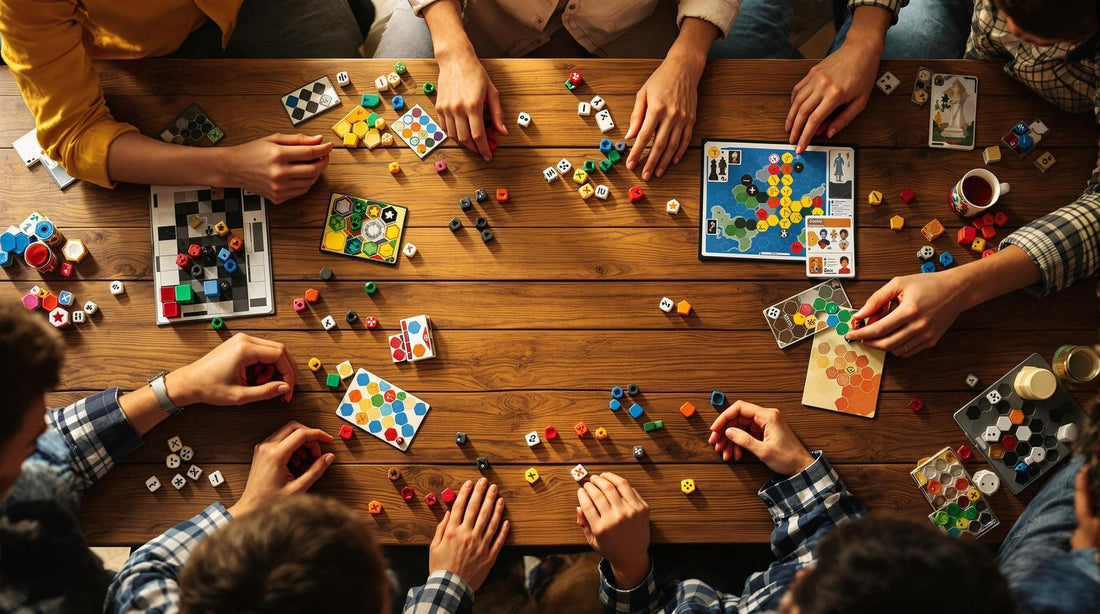
10 Best Family Board Games for Mental Stimulation
Looking for board games that are fun and boost mental skills? Here's your quick guide to 10 family-friendly games that sharpen problem-solving, strategy, and social skills while creating lasting memories. These games are perfect for all ages and skill levels, offering a mix of creativity, logic, and teamwork.
Top Picks:
- Codenames: Improves word association and teamwork through clever clue-giving.
- Ticket to Ride: Builds strategic planning and geography knowledge with route-building.
- Catan: Enhances resource management and negotiation skills in a competitive setting.
- Azul: Develops pattern recognition and spatial reasoning with beautiful tile mechanics.
- Pandemic: Teaches collaboration and critical thinking in a team-based challenge.
- Dixit: Encourages creative storytelling and abstract thinking with surreal artwork.
- Blokus: Strengthens spatial reasoning and strategic planning on a shared grid.
- Carcassonne: Combines tile placement and resource management for strategic play.
- Chess: A timeless game for developing strategy, focus, and problem-solving.
- Brain Games Puzzle Collection: A mix of puzzles targeting logic, spatial awareness, and vocabulary.
How to Choose:
- For younger kids: Start with Blokus, Dixit, or Azul.
- For teamwork: Try Pandemic or Codenames.
- For strategy lovers: Go for Catan, Ticket to Ride, or Chess.
- For quick mental exercises: Pick the Brain Games Puzzle Collection.
Quick Comparison Table:
| Game | Key Skills Developed | Ideal For | Players | Playtime |
|---|---|---|---|---|
| Codenames | Word association, teamwork | Ages 10+ | 2-8 | 15-30 min |
| Ticket to Ride | Strategy, geography | Ages 8+ | 2-5 | 30-60 min |
| Catan | Resource management, negotiation | Ages 10+ | 3-4 | 60-120 min |
| Azul | Pattern recognition, spatial | Ages 8+ | 2-4 | 30-45 min |
| Pandemic | Collaboration, critical thinking | Ages 8+ | 2-4 | 45-60 min |
| Dixit | Creative thinking, storytelling | Ages 8+ | 3-6 | 30 min |
| Blokus | Spatial reasoning, strategy | Ages 7+ | 2-4 | 20-30 min |
| Carcassonne | Tile placement, planning | Ages 7+ | 2-5 | 30-45 min |
| Chess | Strategy, problem-solving | Ages 6+ | 2 | Varies |
| Brain Games Collection | Logic, vocabulary, math | All ages | 1+ | Varies |
These games combine fun with cognitive benefits, making them perfect for family game nights. Dive into the full article for detailed reviews and tips for each game!
Top 20 Favorite Board Games for the Family
How Board Games Help Mental Development
Board games are an excellent way to build mental skills by engaging in a variety of thought processes. They provide a fun and interactive way for families to learn together while boosting important cognitive abilities.
Here’s how board games can sharpen mental skills:
| Cognitive Skill | How Games Develop It | Example Game |
|---|---|---|
| Pattern Recognition | Spotting recurring combinations | Azul |
| Problem-solving | Tackling challenges creatively | Pandemic |
| Spatial Reasoning | Moving and placing pieces effectively | Blokus |
Games like Chess encourage strategic thinking and planning, while Catan focuses on managing resources effectively.
Even simpler family-friendly games contribute to mental growth by:
- Improving working memory through remembering rules
- Enhancing decision-making with risk-and-reward scenarios
- Strengthening math skills through probability-based decisions
- Increasing spatial awareness via visual challenges
Different types of games focus on specific skills. Strategy games help with planning and critical thinking, while word games are great for boosting language abilities. Research highlights that this variety can support well-rounded cognitive development for players of all ages.
1. Codenames
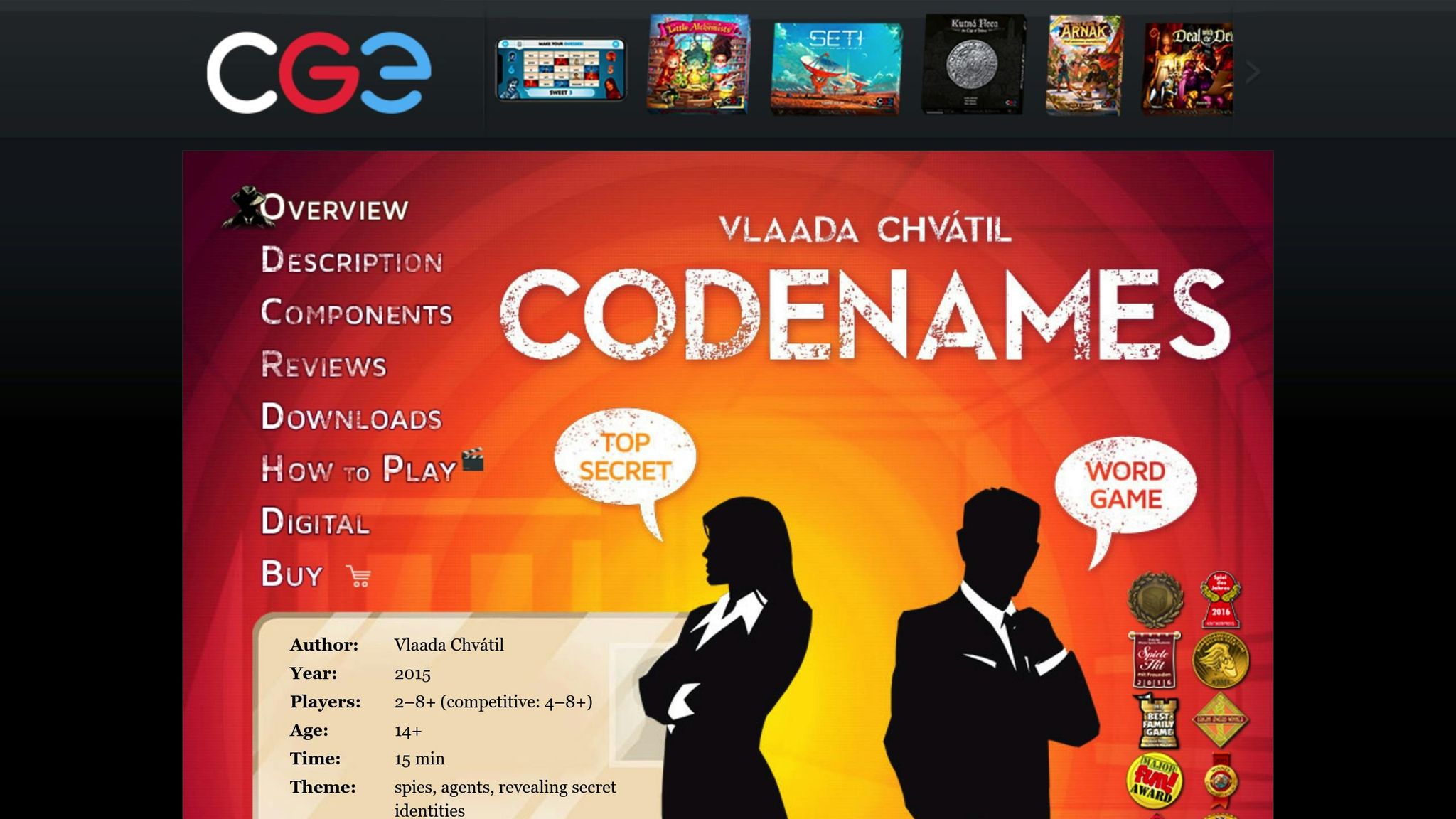
Codenames is a family board game that combines fun with mental challenge. In this team-based word-guessing game, players work together to identify secret agents using single-word clues provided by their spymaster. The game encourages players to think creatively and logically, making it a great way to sharpen mental skills while having fun. Studies highlight how board games like Codenames can support learning and skill-building.
| Game Aspect | Mental Benefits |
|---|---|
| Word Association | Boosts creative thinking and vocabulary |
| Team Discussion | Improves communication and teamwork skills |
| Clue Analysis | Strengthens deductive reasoning and strategy |
| Multiple Interpretations | Encourages flexible and abstract thinking |
Codenames hones two main cognitive abilities:
- Precision in Language: Spymasters must create single-word clues that connect multiple terms.
- Creative Interpretation: Players need to decipher ambiguous clues in imaginative ways.
With over 31,000 Amazon reviews and a 4.8/5 rating, Codenames has proven its appeal as both a fun activity and a mental workout. The game also offers themed versions like Disney, Marvel, and Pictures, making it accessible for different age groups while maintaining the same brain-boosting challenges. It’s a perfect example of how modern board games can be both entertaining and mentally engaging.
2. Ticket to Ride
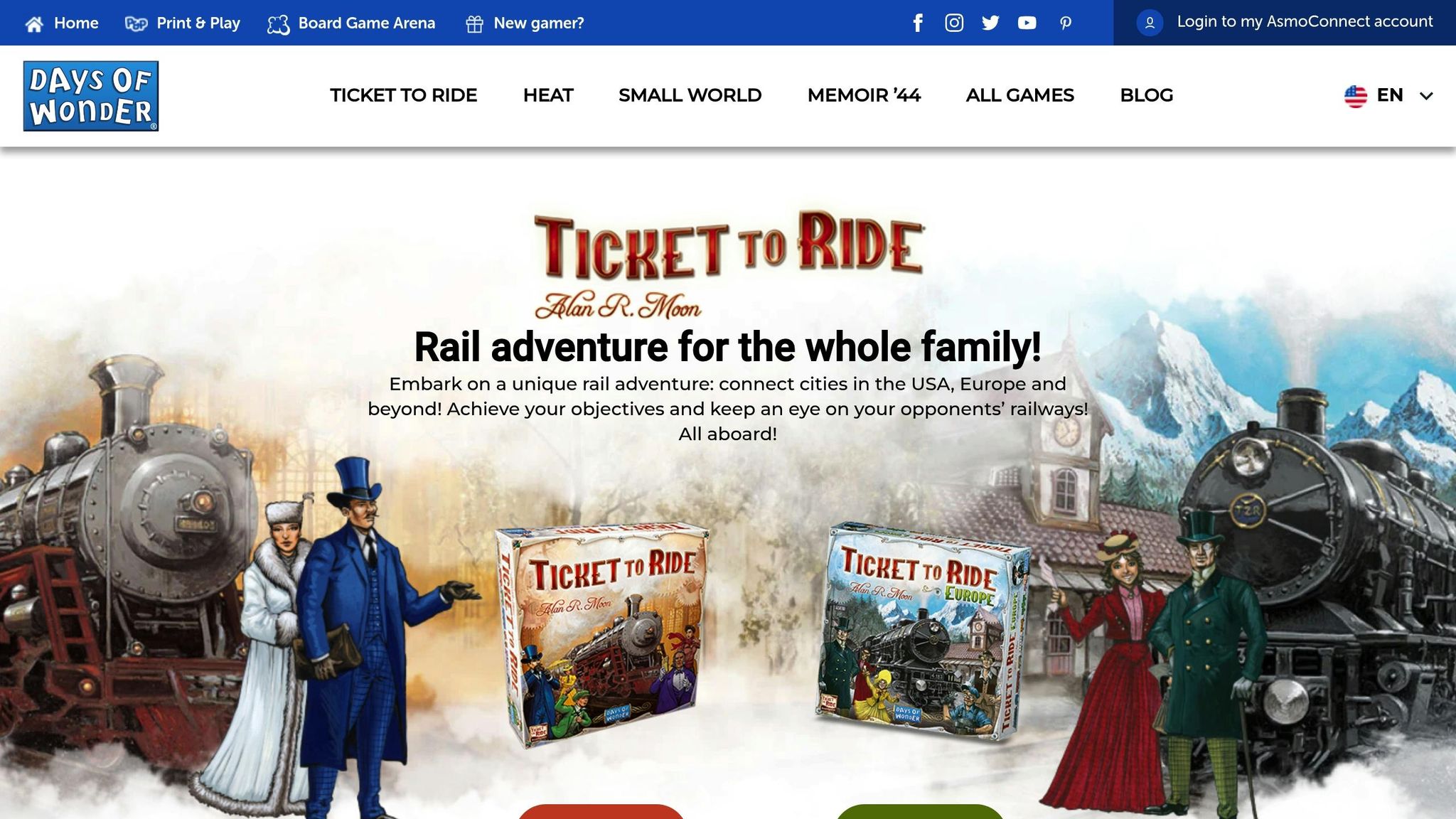
Ticket to Ride is a railway-themed board game that combines fun with mental challenges, making it a hit for family game nights. With over 6 million copies sold and an impressive 4.8/5 rating from more than 27,000 Amazon reviews, it's clear this game has staying power.
The game stands out for its strategic depth. Players collect train cards and build railway routes across a map, engaging in various mental exercises along the way:
| Cognitive Skill | Game Element | How It Helps |
|---|---|---|
| Strategic Planning | Building Routes | Sharpens decision-making skills |
| Resource Management | Collecting Cards | Boosts analytical thinking |
| Spatial Reasoning | Navigating the Map | Improves spatial awareness |
| Risk Assessment | Choosing Tickets | Encourages critical thinking |
With a playtime of 30-60 minutes, the game also offers a fun way to learn geography, thanks to its colorful maps and route-building mechanics. Editions like Europe and Asia provide new challenges to keep things interesting.
Tips to Up Your Game:
- Focus on shorter routes early to score quick points.
- Keep an eye on your opponents' moves to block key routes.
- Plan ahead to aim for the longest path bonus.
As the 2004 Spiel des Jahres winner, Ticket to Ride continues to captivate players with its easy-to-learn rules and strategic depth. It's a perfect mix of fun and mental exercise for players of all ages.
3. Catan

Catan, created by Klaus Teuber in 1995, takes the geographical strategy of games like Ticket to Ride and adds a layer of economic complexity with its well-known resource trading system. This game challenges players to juggle resource management, negotiation, and strategic planning - skills tied to cognitive development. Players gather wood, grain, brick, ore, and wool to build settlements on a modular hexagonal board that ensures a different experience every time.
The modular board design, with its hexagonal terrain tiles, makes each game feel fresh. The goal? Be the first to reach 10 victory points by building settlements, cities, and roads while managing resources effectively.
| Mental Skill | Game Element | Cognitive Benefit |
|---|---|---|
| Probability Analysis | Dice Rolling | Improves risk assessment |
| Strategic Planning | Settlement Placement | Encourages long-term thinking |
| Social Intelligence | Player Negotiations | Builds communication skills |
Key Strategic Elements:
- Development cards can provide both tactical advantages and extra victory points.
- Where you place your initial settlements can make or break your strategy.
Though designed for ages 10 and up, families can simplify the rules or opt for Catan Junior, a pirate-themed version, for younger players.
Pro Tip: Start with the base game to get a solid grasp of the mechanics before diving into expansions like Seafarers or Cities & Knights, which add more complexity and challenges.
Catan’s mix of luck and strategy keeps it engaging while teaching resource management, negotiation, and forward-thinking skills that go beyond the game itself. It’s a perfect blend of fun and learning for players of all ages.
4. Azul
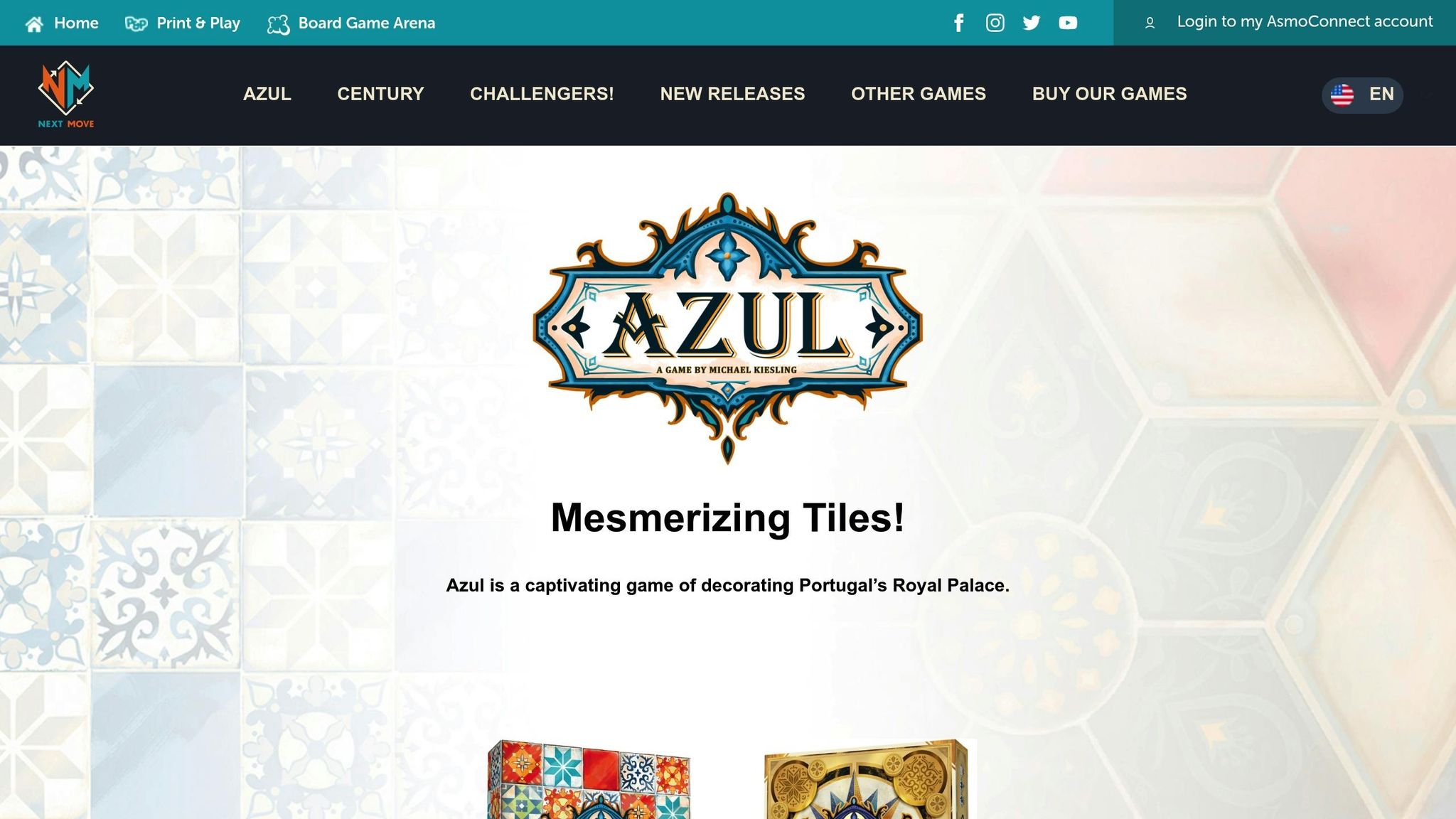
Azul takes the resource management concept from games like Catan and adds a visual twist. This game challenges players with pattern recognition and spatial reasoning, skills that are key to cognitive development. Designed by Michael Kiesling and launched in 2017, Azul draws inspiration from Moorish tile art, creating a visually engaging and logical puzzle. Its sleek design has earned widespread praise.
In Azul, players pick colorful tiles from shared factory displays and arrange them strategically on their boards. The goal? Balance short-term gains with long-term strategies, much like the cooperative planning in Pandemic, but here, it's an individual effort.
| Cognitive Skill | Game Element |
|---|---|
| Pattern Recognition & Visual Processing | Choosing and arranging tiles |
| Spatial Awareness & Geometric Understanding | Optimizing board layouts |
| Strategic Planning & Decision-making | Managing resources effectively |
Azul's simple rules make it great for all ages, starting at 8 years old. However, experienced players can ramp up the challenge with tactics like blocking opponents' moves or maximizing their own point combinations.
Tips for Playing Strategically
- Focus on completing rows early to secure steady points.
- Keep an eye on opponents and block their high-value patterns when possible.
- Weigh the benefits of immediate points against setting up future opportunities.
Parents can turn Azul into a learning moment by discussing color patterns, practicing counting, and encouraging kids to think a few moves ahead.
"Azul strikes a perfect balance between accessibility and depth, making it an ideal choice for family game nights."
Pro Tip: Start with the original Azul game before diving into spin-offs like Stained Glass of Sintra. This helps everyone get comfortable with the basics before taking on new twists.
5. Pandemic
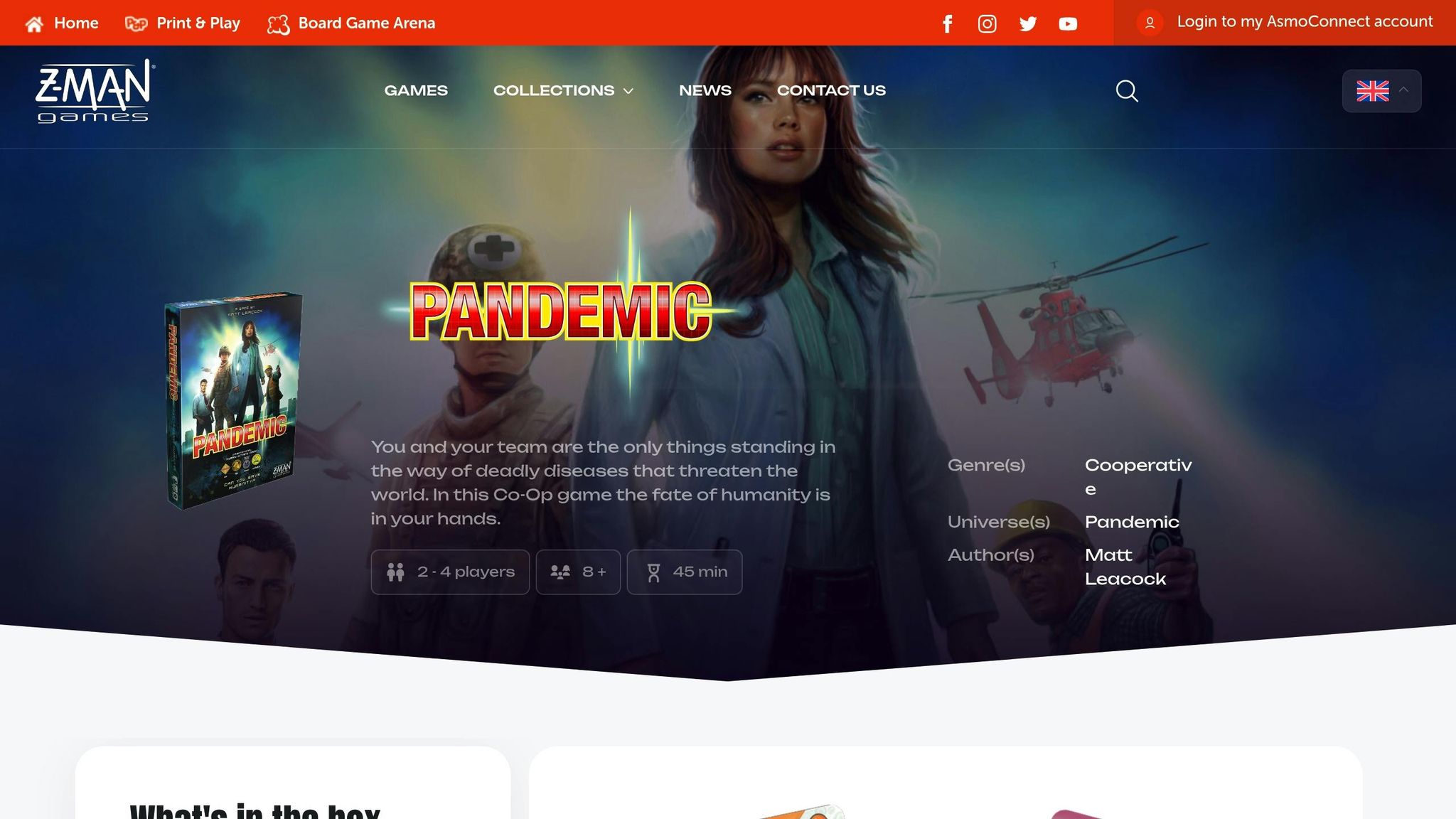
Pandemic is a standout in the world of cooperative board games, blending strategy and teamwork in a way few games do. Created by Matt Leacock and released in 2008, this highly regarded game puts 2-4 players in the roles of disease control specialists, working together to stop global outbreaks.
Unlike competitive games like Azul, Pandemic shifts the focus to collaboration. Instead of competing, players must solve problems as a team, which introduces a whole new layer of critical thinking. The game board features a global map where diseases spread unpredictably, challenging players to plan ahead while staying flexible.
| Cognitive Skill | Game Element | Learning Benefit |
|---|---|---|
| Collaborative Prioritization | Resource Management | Encourages perspective-taking through role specialization |
| Risk Assessment | Disease Spread Patterns | Builds an understanding of probability and consequences |
| Spatial Reasoning | Global Map Navigation | Enhances geographical awareness |
| Communication | Team Coordination | Improves clarity in expressing ideas |
Players can adjust the game's difficulty by including 4-6 epidemic cards, making it suitable for different experience levels.
Key Strategic Elements
- Role Synergy: Each player has a unique role with special abilities, encouraging teamwork.
- Resource Management: Players must juggle treating diseases while gathering cards to discover cures.
- Crisis Prevention: Anticipating outbreaks and stopping them before they escalate is crucial.
What makes Pandemic truly engaging is how it sparks meaningful conversations and decisions. Families work together to assess threats and adapt their strategies as the game progresses.
Pro Tip: Focus your initial efforts on preventing outbreaks in highly connected regions. This strategy helps new players understand the mechanics while developing their planning skills.
Pandemic also teaches lessons that go beyond the game itself, offering insights into disease control and geography. With a BoardGameGeek rating of 7.6/10 from over 118,000 ratings, it’s a perfect example of how learning and fun can go hand in hand.
sbb-itb-1ed942f
6. Dixit
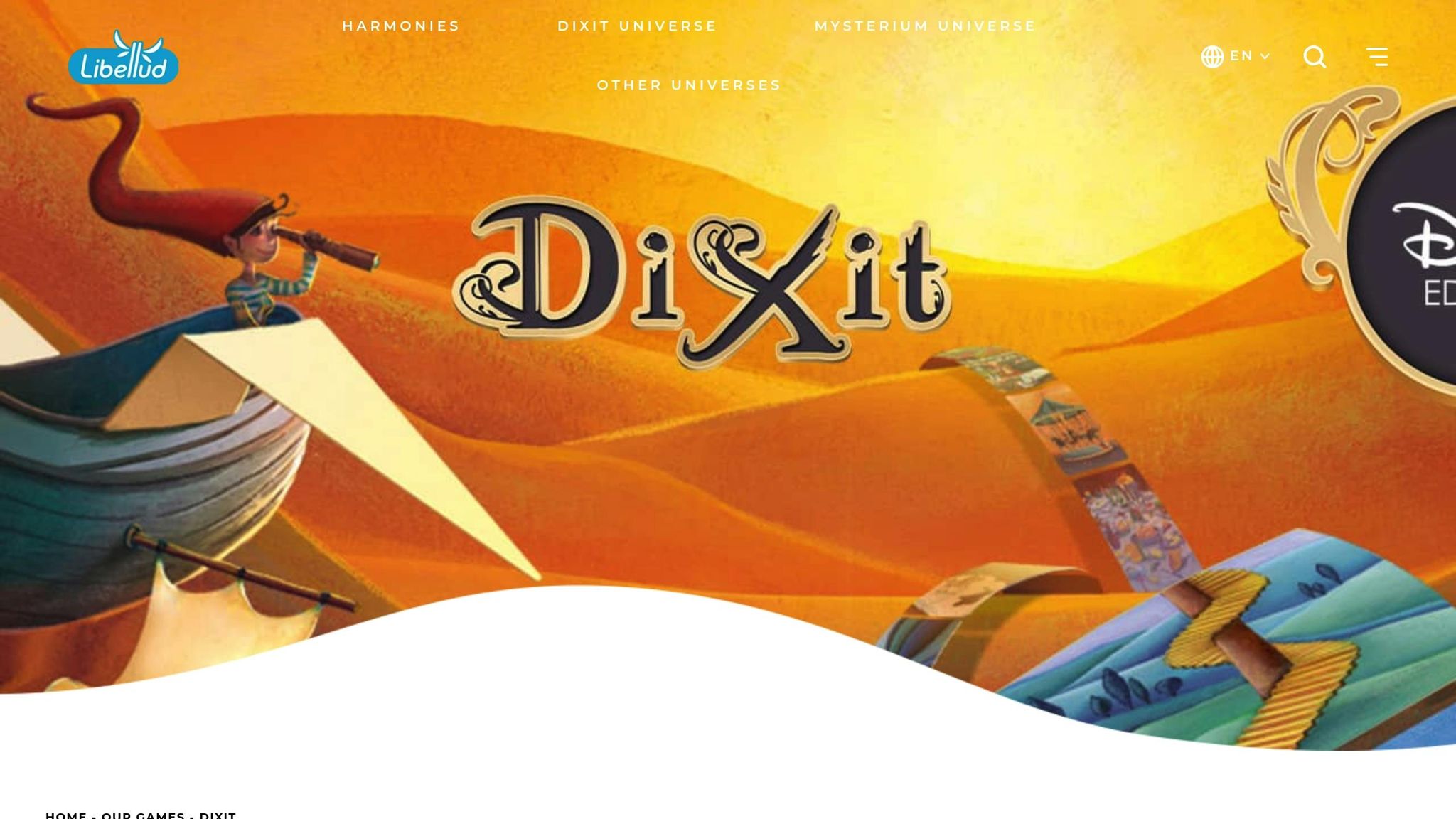
Dixit, created by Jean-Louis Roubira, takes the concept of word association found in games like Codenames and shifts it toward visual storytelling and abstract thinking. With its surreal artwork and focus on interpretation, the game has sold over 9 million copies globally as of 2021.
At the heart of Dixit are its 84 intricately illustrated cards, each featuring surreal imagery open to endless interpretations. The game strikes a fine balance between simplicity and depth. Its rules are easy enough for kids aged 8 and up to understand, yet it offers a level of strategic complexity that keeps adults intrigued. Players must craft clues that are neither too obvious nor too vague to earn points.
| Cognitive Skill | Development Aspect | Learning Outcome |
|---|---|---|
| Creative Thinking | Abstract Interpretation | Improved metaphorical reasoning |
| Social Cognition | Perspective Taking | Better emotional understanding |
| Language Skills | Storytelling | Broader vocabulary and expression |
| Critical Analysis | Clue Decoding | Sharpened analytical thinking |
Educational Benefits
Dixit ties into the article’s focus by encouraging flexible thinking - an essential skill for problem-solving. Families often praise the game for sparking meaningful conversations and encouraging creative expression.
Tips for Strategic Play:
- Craft clues that balance clarity with ambiguity.
- Anticipate how others might interpret your card.
- Pay attention to voting patterns to refine your strategy.
Pro Tip: When playing with kids and adults together, guide younger players to focus on concrete details in the artwork before diving into more abstract interpretations.
Dixit expansions introduce new cards with fresh artwork, keeping the gameplay engaging while continuing to promote creative thinking and interpretation skills.
7. Blokus
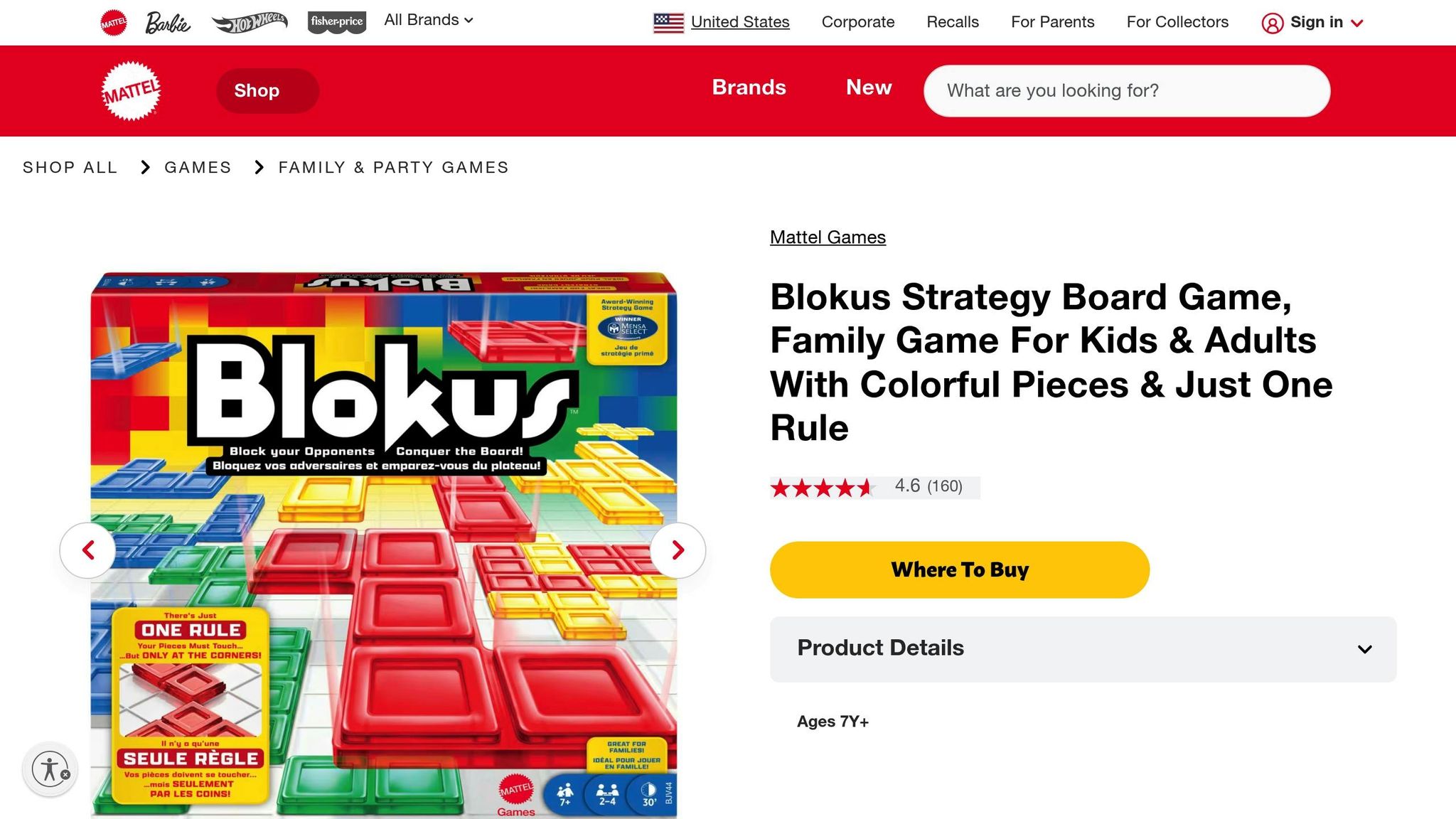
Blokus shifts gears from Dixit's storytelling focus to a game that tests spatial reasoning and strategy. With straightforward rules, it delivers a challenging and engaging experience, blending competition with cognitive skill-building.
Played on a 20x20 grid, Blokus involves placing 21 polyomino pieces while following specific corner-touching rules. The objective? Strategically block your opponents while creating opportunities for yourself. This game rewards careful planning and spatial awareness, making every move count.
| Cognitive Skill | Development Benefit | Application |
|---|---|---|
| Spatial Reasoning | Visual-spatial processing | Mental rotation and piece placement |
| Strategic Planning | Forward thinking | Anticipating multiple moves ahead |
| Pattern Recognition | Visual processing | Spotting placement opportunities |
| Resource Management | Decision making | Using pieces efficiently |
Educational Value
Blokus is a great fit for families, as its rules can be adjusted for players of different ages. It’s particularly effective for improving spatial reasoning, making it a solid choice for family game nights.
Tips for Success
- Start by placing your first piece in a corner to set up future moves.
- Focus on creating paths for yourself while blocking your opponents.
- Save key pieces for the late game, adapting your strategy as the board fills up.
For families with younger kids, the game can be simplified. While designed for ages 7 and up, parents can tweak the gameplay for children as young as 5 by reducing the number of pieces or using a smaller grid.
8. Carcassonne
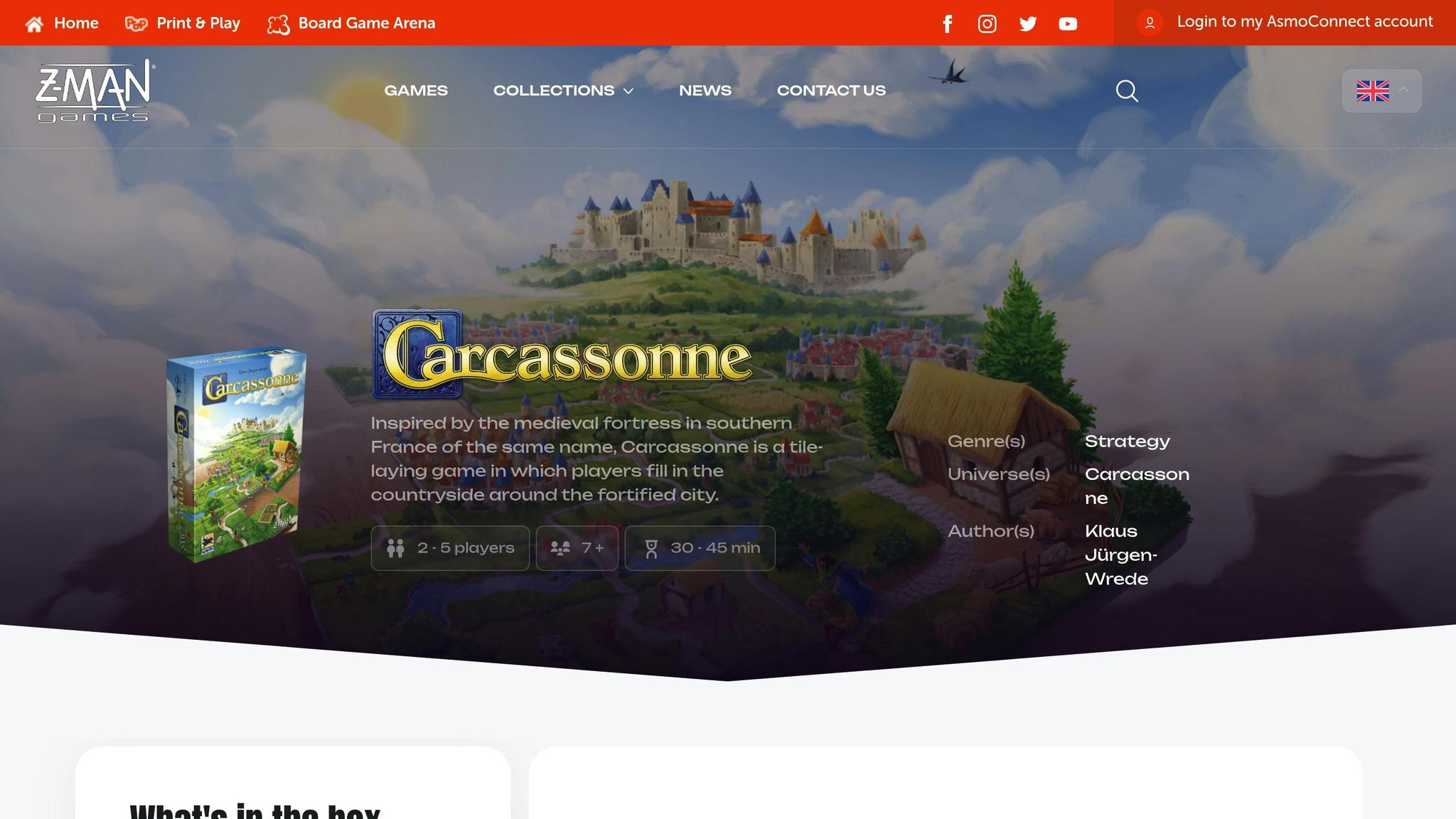
Carcassonne builds on the spatial reasoning found in games like Blokus but adds another layer of strategy with its evolving board and resource management. Players collaboratively create a shared landscape by placing tiles, constantly weighing short-term benefits against long-term positioning.
| Feature | Mental Benefit | Family Impact |
|---|---|---|
| Tile Placement | Spatial Reasoning | Encourages group decisions |
| Meeple Management | Resource Planning | Sparks strategic discussions |
| Territory Building | Pattern Recognition | Promotes future planning |
| Scoring System | Mathematical Thinking | Builds a sense of progress |
Game Mechanics and Learning
Players place terrain tiles and strategically assign meeples to claim cities, roads, and farms. Success hinges on balancing immediate scoring with future opportunities. The basic rules are simple enough for a 7-year-old to understand, but expansions can add layers of complexity for seasoned players.
Educational Benefits
Carcassonne sharpens cognitive skills through its engaging challenges:
- Pattern Recognition: Spotting scoring opportunities as the board evolves
- Resource Management: Allocating limited meeples wisely
Family-Friendly Features
The straightforward rules make it easy for kids aged 7 and up to join in, while expansions like The River introduce new challenges for more experienced players.
Tips for Success
To get the most out of Carcassonne, both in fun and learning:
- Start by completing smaller features to keep your meeples available.
- Watch your opponents' unfinished structures and consider ways to block them.
- Save farmer placements for the endgame to secure big points.
9. Chess
Chess is a timeless game that combines strategy and spatial reasoning, offering families a mental workout like no other. Its mix of simplicity and depth ensures it remains engaging for players of all skill levels.
Educational Benefits
Studies reveal that playing chess can boost math scores by 17%, thanks to its focus on strategic thinking and analytical skills. It also sharpens concentration and problem-solving abilities, making it a valuable tool for cognitive development.
How Families Can Learn Together
Here’s how to make chess a fun and educational experience for the whole family:
- Start with the Basics: Begin by teaching how each piece moves before diving into strategies.
- Use Chess Technology: Platforms like Chess.com make learning interactive and enjoyable.
- Play as a Team: Schedule regular family games to learn and grow together.
Adapting for Younger Players
For younger or less experienced family members, try variants like Chess960, which randomizes starting positions, or Progressive Chess, where players make more moves as the game progresses. These tweaks keep the game exciting and level the playing field.
Tips for Success
- Create a cozy chess corner at home.
- Explore chess apps for hands-on practice.
- Join local chess clubs to meet other enthusiasts.
- Organize family tournaments for friendly competition.
- Focus on improvement rather than just winning.
Chess offers a unique way for families to bond over a shared intellectual challenge while building valuable skills.
10. Brain Games Puzzle Collection
Looking for a fun way to challenge your brain beyond the usual board games? The Brain Games Puzzle Collection brings a mix of puzzles designed to give your mind a workout. Unlike games like Chess or Carcassonne, this collection focuses on specific mental exercises tailored to different thinking styles and skill levels.
Variety of Mental Challenges
This collection includes puzzles that target a range of cognitive skills:
| Puzzle Type | Focus Areas | Difficulty Levels |
|---|---|---|
| Logic Grid Puzzles | Critical thinking, deduction | Beginner to Expert |
| Visual Challenges | Spatial awareness, pattern recognition | All ages |
| Word Games | Vocabulary, language processing | Progressive |
| Number Puzzles | Mathematical reasoning, sequencing | Tiered difficulty |
Boosts Learning and Thinking Skills
Solving puzzles regularly can sharpen problem-solving abilities and improve mental flexibility. These benefits complement the more specific skill-building focus found in other games.
Great for All Ages
Similar to games like Codenames or Dixit, this collection works well for families with a mix of ages thanks to its adjustable challenges:
- Puzzles tailored for kids
- Timed challenges for a bit of friendly competition
- Digital options like ThinkFun's Brain Fitness (highly rated at 4.6/5 on Amazon) make it easy to play anytime, anywhere
How to Use It
Set up a weekly puzzle night, team up to solve challenges, or work your way through progressively harder puzzles. Tracking progress through different difficulty levels can make it even more engaging.
This collection is a fun way to keep your brain active while spending quality time with family. Plus, it’s a great way to see real improvement in cognitive skills over time.
How to Pick the Right Game for Your Family
Looking at our top 10 recommendations, here are some practical tips to help you choose games that offer both fun and mental stimulation:
Age-Appropriate Complexity
Matching the game's complexity to the players' abilities is crucial for a successful family game night. BoardGameGeek's weight rating system (1-5) can help you gauge how challenging a game might be. Start with easier games and gradually move to more challenging ones as everyone becomes more experienced.
| Experience Level | Recommended Game Types | Example Games |
|---|---|---|
| Beginners | Simple rules, quick rounds | Dixit, Brain Games Puzzle Collection |
| Intermediate | Strategic choices, longer gameplay | Catan, Azul |
| Advanced | Complex strategies, multiple mechanics | Ticket to Ride, Carcassonne |
Matching Game Length to Your Schedule
Consider how much time you have and pick a game that fits. Many games offer flexible rules to suit different schedules:
- Short games (15-30 minutes): Great for busy weeknights
- Medium-length games (30-60 minutes): Perfect for casual weekends
- Longer games (60+ minutes): Best for when you have dedicated time
Adapting to Your Family Size
Choose a game that works well with the number of players in your family. Look for games that specify:
- The minimum number of players needed for optimal gameplay
- The maximum number of players it can accommodate
- Rules that adapt well to different group sizes
Balancing Fun and Learning
Pick games that naturally incorporate learning through gameplay rather than those with forced educational elements. This keeps the experience engaging while still offering cognitive benefits.
Durability of Game Components
If you have younger children, opt for games with sturdy pieces that can handle some wear and tear.
Try Before You Buy
Before committing to a purchase, try out the game in different ways:
- Play digital versions of the game
- Watch tutorial videos online
- Visit local game cafes to test it out
Many of the games we’ve recommended offer digital versions, making it easy to test them before investing.
Conclusion
Board games offer a great way to bring families together while also boosting mental skills. In fact, research highlights that 91% of families feel a stronger connection when they play games together. The mix of social interaction and mental challenges makes board games a perfect choice for families looking for both fun and intellectual engagement.
The 10 games we’ve highlighted show how modern board games have grown to provide exciting ways to challenge the mind and strengthen family ties. From strategic thinking to creative problem-solving, these games offer more than just entertainment - they create opportunities for growth and connection.
How to Get the Most Out of These Games
To make the most of these games, try setting aside a regular game night with your family. Rotate through different games, like Pandemic or Carcassonne, to keep things fresh and reinforce various skills. Talking about in-game decisions can also help sharpen critical thinking and decision-making abilities that apply to everyday life.
These shared moments do more than build skills - they create memories that last a lifetime.
FAQs
What are the best family board games?
Top picks include Catan, Ticket to Ride, and Codenames. These games are easy to learn yet offer enough depth to keep everyone engaged. They also encourage strategic thinking and problem-solving, which we discussed earlier in the article.
What is the best board game to play with family?
The best choice depends on your family's interests and age group. For example, Pandemic stands out for its team-based gameplay, teaching crisis management and geography skills. Meanwhile, games like Blokus and Azul focus on spatial reasoning, offering fun yet mentally stimulating challenges.
Switching up game genres during family game nights can keep things interesting while helping everyone develop a range of cognitive skills.






